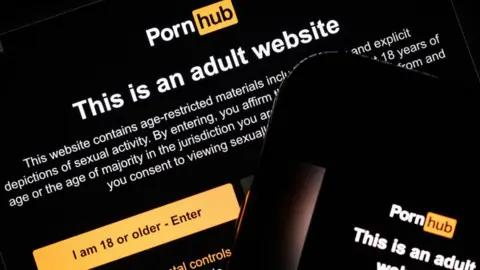**EU Investigation of Pornhub and Other Adult Websites for Child Safety Compliance**
In an important development, the European Union (EU) has initiated an investigation into Pornhub, Stripchat, and two other adult content websites, XVideos and XNXX, over concerns that they may not be complying with stringent online content laws. The European Commission has raised alarms that these platforms seemingly lack adequate measures to protect children and safeguard their rights while using the internet. This inquiry is part of an increasing global trend of scrutiny directed at adult content sites, especially concerning their practices around age verification and child safety.
**Concerns Over Age Verification and Child Safety**
The crux of the EU’s investigation centers around the apparent absence of “appropriate” age verification methods on these adult websites. The Commission has highlighted that these platforms do not appear to have implemented the necessary tools required to prevent children from gaining access to adult material. They have emphasized that online services must prioritize the rights and best interests of children in both their design and operation, indicating a serious lapse on the part of these websites in adhering to these fundamental responsibilities.
Critically, the Commission’s findings suggest that the common “click away” pop-ups—simple prompts asking users to confirm whether they are over the age of 18—do not constitute a reliable method for ensuring that minors do not access adult content. This statement points to the inadequacy of existing measures intended to protect children from potentially harmful content online.
**Wider Context of Regulatory Scrutiny**
The EU’s investigation occurs in a context where there is heightened awareness of the implications of online pornography on minors. The UK’s online safety regulator, Ofcom, has also announced two inquiries into similar issues with porn sites failing to implement effective age verification systems. This growing regulatory landscape underscores a collective understanding that significant actions need to be taken against platforms neglecting to safeguard young users.
While Pornhub remains the most visited adult website globally—and is ranked as the 19th most visited site across the internet—its increasing regulatory pressures indicate a shift in the online landscape. The platform has already taken steps in response to legislation in the United States, blocking access in 16 states, including major regions like Alabama and Texas, where laws mandate stringent age verification protocols.
**Upcoming Regulatory Challenges and Responsibilities**
In terms of regulatory framework, the companies under investigation were designated as Very Large Online Platforms (VLOPs) under the EU’s Digital Services Act (DSA) as of 2023. This designation subjects them to more rigorous obligations to tackle harmful and illegal content on their platforms. If any non-compliance with DSA stipulations is confirmed, these platforms could face serious repercussions, including potential fines amounting to 6% of their annual revenue.
While Stripchat has been removed from the VLOP designation amid the ongoing investigation, the Commission has clarified that the scrutiny into their practices will continue. Importantly, even smaller platforms that do not meet the DSA’s threshold of 45 million users in the EU will be required to comply with the bloc’s mandates aimed at protecting minors online.
**Commitment to Online Safety**
The EU’s commitment to ensuring the safety of children online is reflected in the statements from officials, including Henna Virkkunen, the Commission’s executive vice-president for technology security and democracy. She emphasized that priorities are centered on protecting minors, allowing safe navigation online, and fostering a collaborative effort among EU member states to tackle any potential hazards posed to young users. With coordinated actions anticipated to reinforce requirements for smaller pornography sites, the overarching message is one of vigilance and proactive measures in safeguarding the rights and well-being of children on the internet.
In conclusion, the investigation into Pornhub and similar platforms signifies a crucial push towards more robust age verification practices and the protection of minors, reflecting a changing attitude towards online content and the responsibilities of digital platforms. The outcomes of this inquiry may set significant precedents for the ongoing evolution of digital safety regulations.



